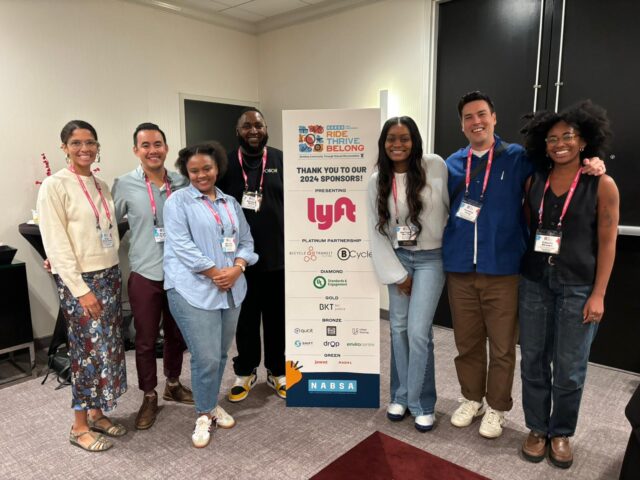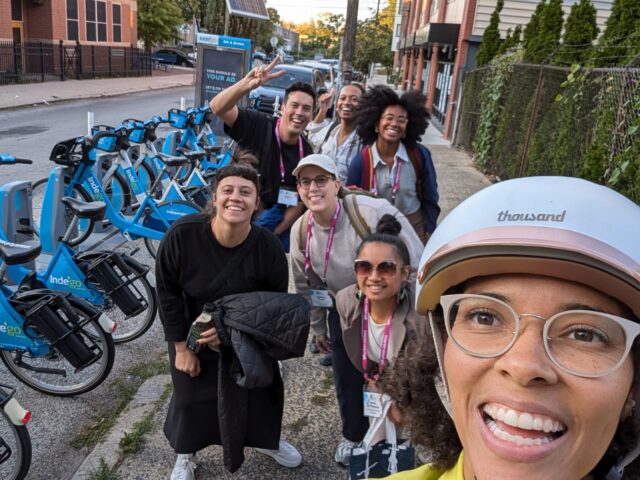Key Takeaways From the 2024 NABSA Conference
by Odochi Akwani, Writer and Content Manager
October 17, 2024
The shared micromobility industry met in Philadelphia to learn from and share ideas with a network of colleagues from around the world and discuss important issues facing bike and scooter share.
The 2024 North American Bikeshare and Scootershare Association (NABSA) annual conference was hosted by BBSP’s partner organization, the City of Philadelphia, from October 7-9. Over the course of two days, attendees enjoyed connecting with friends and colleagues during keynote presentations, breakout sessions, walking and biking mobile workshops (including a tour of Indego’s operation warehouse in South Philadelphia), plus several networking opportunities in line with this year’s conference theme: Ride, Thrive, Belong: Building Community Through Shared Micromobility.
The conference began with a land acknowledgment from Tavis Sanders and Meredith Marshall from Indigenous Education who called for the industry to engage with indigenous communities. The keynote speaker, Anna Zivarts, is a low-vision parent, non-driver, bicyclist, and author of “When Driving Is Not an Option: Steering Away from Car Dependency.” Zivarts called for the industry to do more to engage with those who have visual impairments because many low-vision people can and do ride bicycles.
We collected our top seven key takeaways from this year’s conference, spotlighting the path to greater equity in shared micromobility (SMM).
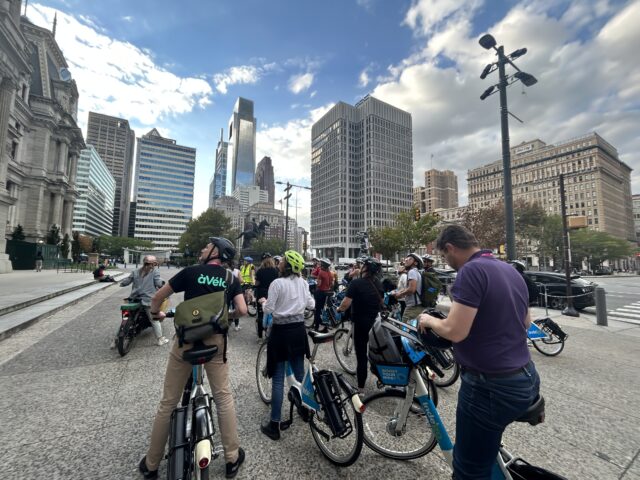
- Children Need to Go Places Too
Zivarts spoke about how SMM is a public good for youth who can’t rely on their parents to drive them to school, activities, or part-time jobs. She also said that no matter a person’s age, there’s often an emotional burden that comes with asking for rides. In a session titled “Serving the Under-Represented Rider: Tools for Success,” Taylor MacVittie, the community pass and corporate program coordinator at Vancouver Bike Share, shared insights into how their organization has engaged youth as young as 12 in bike share through their Youth Community Pass. Vancouver has leveraged its partnership with schools and the local government to take on some of the engagement and recruitment work. Their 12-year-old age requirement was made possible through insurance that stipulated height over age.
- Risk Purchasing Groups (RPGs) Could Offer Insurance Solutions
Insurance is a hot topic in SMM, especially for smaller or nonprofit systems that often don’t qualify or have to pay a higher cost to insure their systems compared to large fleets. High insurance costs force systems to balance trade-offs, sometimes forcing them to cut down on community programming work. In the session titled “Partnering for Success: The Role of Community Partnerships in Building Vibrant Shared Micromobility Systems,” principal consultant at Rebel Group Colin Hughes spoke on the importance of data sharing between operators. As a newer industry, data is gold. If insurance entities can better understand pricing, it could lower the overall cost of general liability insurance. Additionally, through Risk Purchasing Groups (RPGs), two or more operators could buy into one policy to share the overall cost and pool their risks.
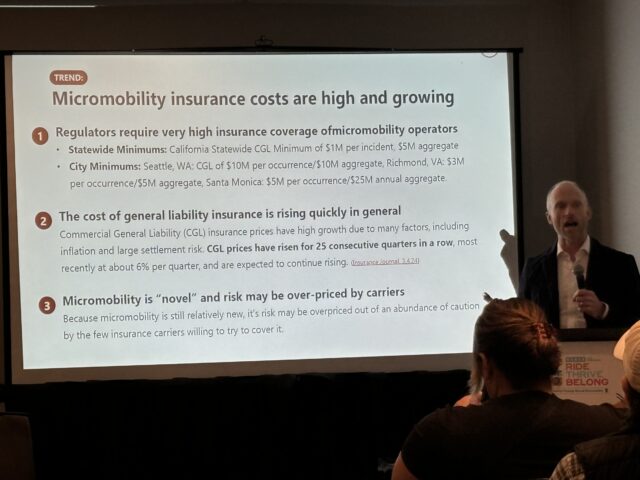
- Availability Does Not Mean Accessibility — “There needs to be public, private, and community partnerships in SMM to make it work.”
The importance of these partnerships were at the core of Bicycle Transit Systems/Indego General Manager Nate Bowman-Johnston’s session. If your work is equity-focused, you must work together with community-based organizations. In Philadelphia, Indego works with community-based organizations to inform and implement its equity strategy. This is outlined through their five-year Equity Plan and showcased through the group of stakeholders they recently convened to help inform decisions around pricing for their system. This focus on equity is also evident in Indego’s expansion plans. In Philadelphia, the organization engaged with founder and executive director of the Strawberry Mansion Community Development Corporation Tonnetta Graham to cultivate a genuine relationship connecting Indego to the neighborhood. “We don’t want to just show up when our bikes show up,” said Waffiyyah Murray, program manager at Indego.
- Don’t Leave Older Adults Out of SMM
Several conference speakers spoke on the high rates of riders above the age of 60. Many attributed this to targeted outreach at in-person events. There’s a growing need to engage older populations in education and safety classes to build self-efficacy and confidence in how to use and access SMM. Stephanie Ridgeway, Indego’s community engagement coordinator, shared insights around how older adults may just need to be educated on the new infrastructure and wayfinding signs that didn’t exist when they first started getting around their cities.
- Adaptive Bikes Should Be Part of Your Fleet
In the session “Adapt and Overcome: Scaling Adaptive Micromobility for Wider Implementation,” Erin Potts, director of marketing and community outreach at POGOH in Pittsburgh, said, “It’s time to hold ourselves accountable as transportation workers.” All systems should be making efforts to accommodate adaptive riders. Systems like POGOH, Hamilton Bike Share, and Biketown in Portland used the resources at their disposal to figure out how to offer some form of adaptive program. Even with limited hours, the impact is evident.
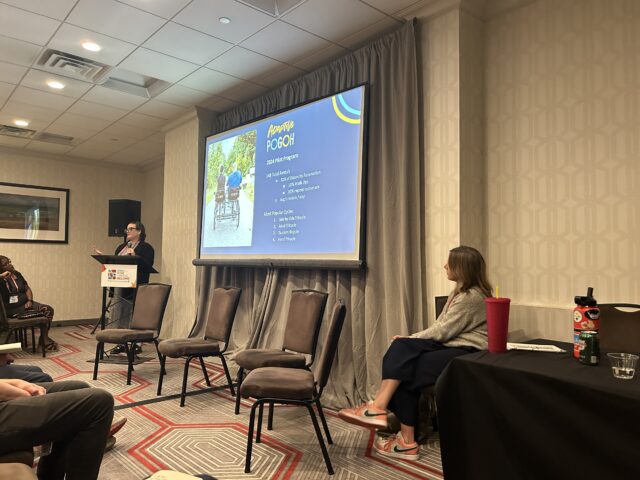
- The Industry is Expanding to Welcome People With a Range of Skill Sets and Backgrounds
On day two, NABSA premiered “Diverse Voices in Shared Micromobility: A Video Series.” To continue promoting diversity, equity, inclusion, and belonging in shared micromobility, NABSA, in partnership with BBSP, developed a series of videos featuring the stories and experiences of people working in shared micromobility in Guadalajara, Mexico; Hamilton, Canada; and Philadelphia. The series offers a way to not only showcase the diversity of people working in SMM, but also the diversity of jobs that are available within SMM. Stay tuned for the series to go live on NABSA’s website in the coming months! We highly recommend giving it a watch.
- The Government Has Many Roles to Play in Supporting SMM
During a keynote panel discussion, Sherelle Streeter from the City of Detroit (and former BBSP Transportation Justice Fellow), Amanda Howell from the Oregon Department of Transportation, and Laura Krull from the Metropolitan Transportation Corporation in San Francisco discussed ideas for how local governments can help support SMM systems.
Main takeaways from the panel were that the government can and should fund SMM, governments should consider stepping in to help with cumbersome contracts and procurement processes, government officials can be advocates for this work, and the government can engage community members to create good SMM policy together. Streeter shared how the City of Detroit invited their local, nonprofit bike share operator (MoGo) and their private scooter operator to weigh in on the city’s proposed SMM ordinance before it went to the city council. Data collection must be a priority to leverage the impact of SMM and get the federal government to see it as transportation.
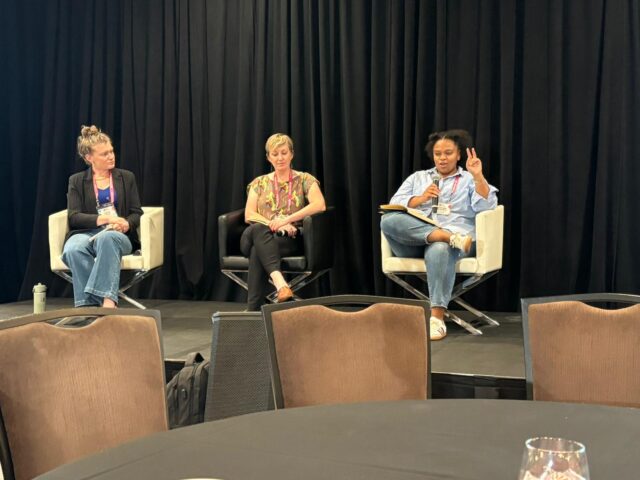
We will see you next year in Montreal, Canada, for #NABSA2025!
